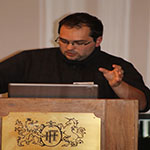Euroacademia Conferences
 Europe Inside-Out: Europe and Europeanness Exposed to Plural Observers (9th Edition) April 24 - 25, 2020
Europe Inside-Out: Europe and Europeanness Exposed to Plural Observers (9th Edition) April 24 - 25, 2020 Identities and Identifications: Politicized Uses of Collective Identities (9th Edition) June 12 - 13, 2020
Identities and Identifications: Politicized Uses of Collective Identities (9th Edition) June 12 - 13, 2020 8th Forum of Critical Studies: Asking Big Questions Again January 24 - 25, 2020
8th Forum of Critical Studies: Asking Big Questions Again January 24 - 25, 2020 Re-Inventing Eastern Europe (7th Edition) December 13 - 14, 2019
Re-Inventing Eastern Europe (7th Edition) December 13 - 14, 2019 The European Union and the Politicization of Europe (8th Edition) October 25 - 26, 2019
The European Union and the Politicization of Europe (8th Edition) October 25 - 26, 2019 Identities and Identifications: Politicized Uses of Collective Identities (8th Edition) June 28 - 29, 2019
Identities and Identifications: Politicized Uses of Collective Identities (8th Edition) June 28 - 29, 2019 The European Union and the Politicization of Europe (7th Edition) January 25 - 26, 2019
The European Union and the Politicization of Europe (7th Edition) January 25 - 26, 2019 7th Forum of Critical Studies: Asking Big Questions Again November 23 - 24, 2018
7th Forum of Critical Studies: Asking Big Questions Again November 23 - 24, 2018 Europe Inside-Out: Europe and Europeanness Exposed to Plural Observers (8th Edition) September 28 - 30, 2018
Europe Inside-Out: Europe and Europeanness Exposed to Plural Observers (8th Edition) September 28 - 30, 2018 Identities and Identifications: Politicized Uses of Collective Identities (7th Edition) June 14 - 15, 2018
Identities and Identifications: Politicized Uses of Collective Identities (7th Edition) June 14 - 15, 2018
Enemy Within: Constructing Social Exclusion in the Czech Media, 2010-2011
-
-

-
Presentation speakers
- Jan Paul and Lubomír Lupták, University of West Bohemia, Czech Republic
- Download presentation
Abstract:
Drawing from Didier Bigo’s concept of ban-opticon, Loïc Wacquant’s analysis of neoliberal governance, Ole Wæver’s securitization theory and the concept of pollution presented by Mary Douglas, we would like to analyze the interpretative frames imposed by the mass media in the Czech Republic during the years 2010 and 2011. Using CAQDAS tools (MAXQDA), we will focus on the categories representing the “post-socialist banlieus” and their inhabitants: “socially excluded areas”, “ghettoes”, “socially excluded communities”, “the unadaptables” and “parasites”, i.e. the “human detritus” scattered around the urban spaces of post-socialist society that went through neoliberal social and economic transformation. We will view the proliferation of these meanings as a symptom of a wider transformation of discourses and practices of governance, constantly signifying a presence of polluted places within the domestic territory and imposing on their inhabitants the meaning of a liminal Other to be concentrated, segregated, regulated, profiled, controlled and suppressed by the repressive and penal apparatus of the state. This construction of an enemy within, the periodic moral panics about various aspects of urban marginality (crime, disease, drug abuse, extremism) and the discourses and practices purporting to deal with the pollution it represents serve as a significant resource of legitimacy which political actors and moral entrepreneurs might exploit and compensate for the losses brought by neoliberal socio-economic transformation.
-
Related Presentations


















